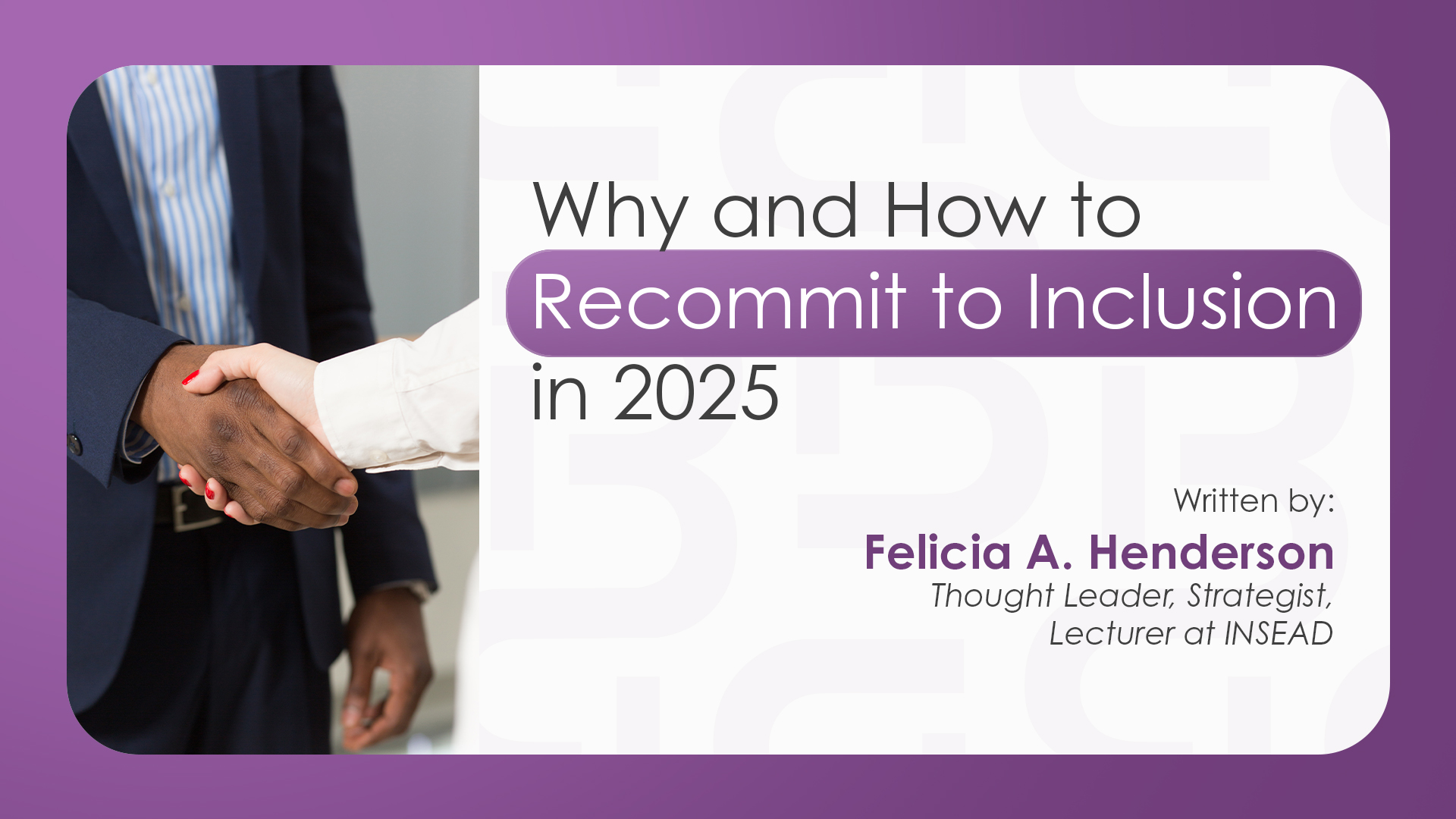Felicia A. Henderson, Lecturer, INSEAD Business School; Adjunct Lecturer Sciences Po Paris
Business leaders following the news from the United States will almost certainly have noticed significant changes in the climate surrounding corporate DEI. The current US administration is overtly opposed to “DEI,” usually an acronym for Diversity, Equity and Inclusion. Without providing a definition of “illegal DEI,” various executive orders purport to ban the “ideology” and practice in government and threaten repercussions for private businesses who engage in it. Although executive orders do not override statutory or constitutional law (and the validity of the DEI bans has been challenged in lawsuits), they do signal policy and enforcement objectives. Reacting to the strong anti-DEI signals, in recent weeks, various US corporations have announced the softening or termination of aspects of their diversity, equity, and inclusion strategies. In some cases, these shifts abandon strong public commitments made less than five years ago in response to the upheaval that propelled social equity (notably, racial disparities), employee well-being, and stakeholder perceptions into C-suite and boardroom discussions beginning in the summer of 2020.
These human concerns remain undiminished today. In fact, the regressive thrust of current US public policy is likely to increase the need for thoughtful corporate equity, diversity, and inclusion strategies. This article presents pressing reasons for corporate leaders to commit or reaffirm their commitments to advancing inclusion. While businesses with US operations or contractual dealings with the American government would be wise to review specifics of their programs and communications with legal counsel, as the article also explains, all companies have opportunities to embrace organizational justice and to enact inclusive practices that promote the thriving of all their employees.
External Fracturing Augments the Need for Internal Inclusion
Businesses operate within an environment that includes numerous forces outside their control. One strand of organizational theory hypothesizes that complexity and uncertainty in the organization’s environment negatively affect employee wellbeing, particularly in organizations with low levels of trust and social support. Consequently, as the external financial and social climates become more tumultuous and antagonistic, it becomes essential for companies to maintain an inclusive workplace climate. To do so, leaders must remain vigilant against the emergence or exacerbation of three phenomena that detract from inclusion: individual distress resulting from social stigmatization, identity-motivated hostile behaviours, and social identity threat.
Employees with one or more identity characteristics that are power remote may experience bigotry and discrimination as an unpredictable and uncontrollable major life stressor. (Note: I use the terms “power remote” and “power proximate” to describe social groups that are sometimes described, respectively, as “minority” or “marginalized” and “majority” or “dominant.”) Employees carry the cognitive, psychological, and physiological burdens of identity-based social stigma with them into the workplace. Studies suggest that this distress can negatively impact individual productivity, absenteeism, and job satisfaction and lead to mental burnout. If stigmatizing rhetoric and behaviour become more prevalent in society and perceived or actual discrimination more common, companies are likely to observe the negative effects of individual distress more frequently. Without an understanding of the link between societal coarsening, identity-based burdens, and negative workplace outcomes, companies may see the effects of individual distress without recognizing or addressing the real causes or the needs of suffering employees.
Another potential impact of a rougher social climate is an increase in beliefs that derogatory language or discriminatory behaviours are acceptable in the workplace. In one flagrant example of this misapprehension, a senior investment banker quoted in the Financial Times celebrated the ability to use a slur for people with developmental disabilities. Overt hostility refers to actions ranging from non-verbal exclusionary behaviours to microaggressions to harassment to targeted violence. Rising workplace hostility could both heighten the distress of targeted individuals and have broader negative repercussions on inclusion. Research shows that impunity cultures – those where overt hostility goes unchallenged – harm all employees, even those who do not share the targeted, power remote identity characteristics. Perpetrators of such actions are observed to have rougher interactions with all co-workers and to engage more frequently in behaviours that detract from team collaboration. Additionally, when not held accountable, the transgressors themselves feel less connected to the organization and have other negative work outcomes (e.g., lower job performance, higher absenteeism). Any increase in unchecked overt hostility in the workplace could reverse prior progress toward building an inclusive culture.
As societal friction increases, employees who are neither potential targets of social exclusion nor inclined to engage in it may nevertheless encounter a cognitive obstacle to inclusive behaviours in the form of social identity threat. The phenomenon as it affects members of power remote groups is perhaps more well-known, but members of power proximate groups also experience social identity threat. In the latter case, it designates the psychological experience of concern when a person’s social group is or is perceived to be associated with socially unacceptable attributes, such as misogyny, ableism, racism, or homophobia. Individuals enact various techniques to manage identity threat. One focus of my work is on how unconscious social identity management impedes effective advocacy at the interpersonal level or the embrace of transformative strategies at the organizational level. If an increase in individual experiences of identity threat shifts attention from creating inclusion to preserving self-image, even companies that seek to maintain a robust commitment to inclusion may see the impact of their efforts muted.
Awareness of Evolving Needs Allows for Adaptive Inclusion Strategies
As external factors create both greater scrutiny of and greater need for diversity, equity, and inclusion programs, leaders need to become knowledgeable about the possibilities available to advance inclusion in their organizations. A range of interventions exists to reduce the internal impact of external turmoil. Companies may need to adjust existing programs or to develop innovative interventions to address the emerging and evolving needs of their employees. In each case, the objective must be to foster the feelings of belonging, community, and justice that are hallmarks of inclusive workplaces.
To support employees who experience distress as a result of identity-based social stigma, companies should provide opportunities for affected individuals to find psychological support. Employee resource groups (ERGs) are a common practice to create a forum for mutual support, information exchange, and shared benefit of external resources, such as expert speakers on topics of common interest. As a complement or substitute (when identity-based ERGs are not feasible), companies can provide all employees with access to psychological support resources. Measures such as including mental health coverage in insurance plans or offering free access to a dedicated mental health resource (for example, a confidential, short-term professional counselling service) benefit all employees, especially those experiencing distress. To ensure that power remote employees are effectively served by these generally available resources, companies should take care to verify the ability of providers to offer culturally responsive support to individuals having the range of backgrounds within their workforce.
Avoiding or minimizing overt hostility in the workplace requires strategies that go behind compliance programs. Accountability cultures require that all employees have a shared belief in personal responsibility along with a sense of self-efficacy and appropriate skills for challenging unacceptable behaviours. It also requires pathways back into community for repentant individuals who have transgressed shared values. Cultivating an ethic of mutual care begins with psychological safety, which among other practices, requires leaders who model humility and curiosity and who seek and equally value input from all team members. To equip employees to engage in constructive confrontation, companies must train all employees to recognize the range of behaviours that constitute overt hostility and provide them with the skills to engage in challenging conversations without rupturing relationships. Such training programs may be crafted to encourage advocacy for specific power remote groups (such as “male allies for women”) or they may be conceived more broadly to promote responsible corporate citizenship. Whatever the design, the objective is to empower collective accountability for upholding the company’s shared values.
Interventions to address social identity threat experienced by those with power proximate identities involve reflective practices that enhance other-oriented behaviours. Individuals learn to recognize the more subtle ways they centre their identity needs and devalue or dismiss the psychological needs of others. Through discussion circles, coaching, or self-directed reflections participants uncover beliefs and behaviours that often thwart even steadfast inclusion efforts. Companies that do not have the luxury to invest in more time-intensive interventions can still employ impactful tools, such as brief self-affirmation activities, stress-management resources, or activation of feelings of social support to promote pro-social behaviour.
Advancing Inclusion Remains Essential and Achievable
The work of creating inclusive workplaces becomes more urgent with each retreat from the ideal of social equality. Even as diversity, equity, and inclusion programs or specific DEI practices come under greater scrutiny, businesses with the capacity to recognize the varied and changing needs of their employees can devise solutions that promote belonging, mutual positive regard, and a shared commitment to individual and collective thriving.



